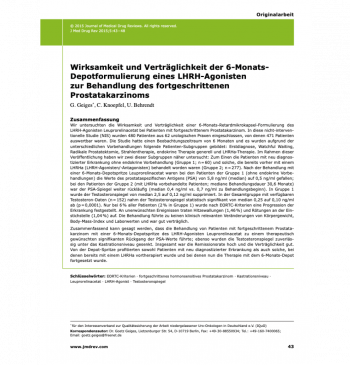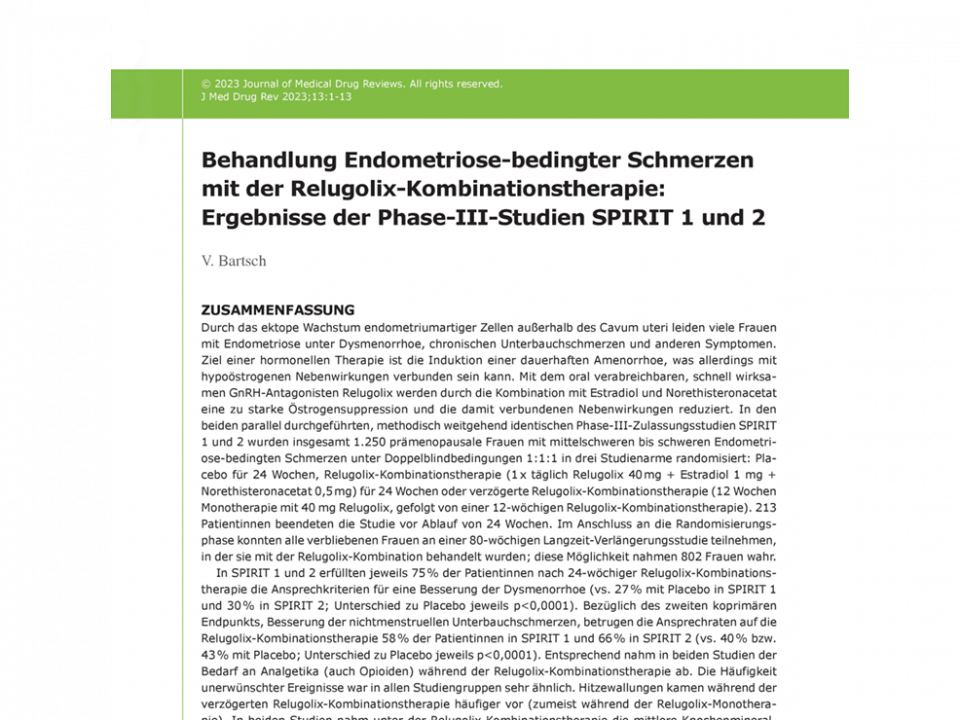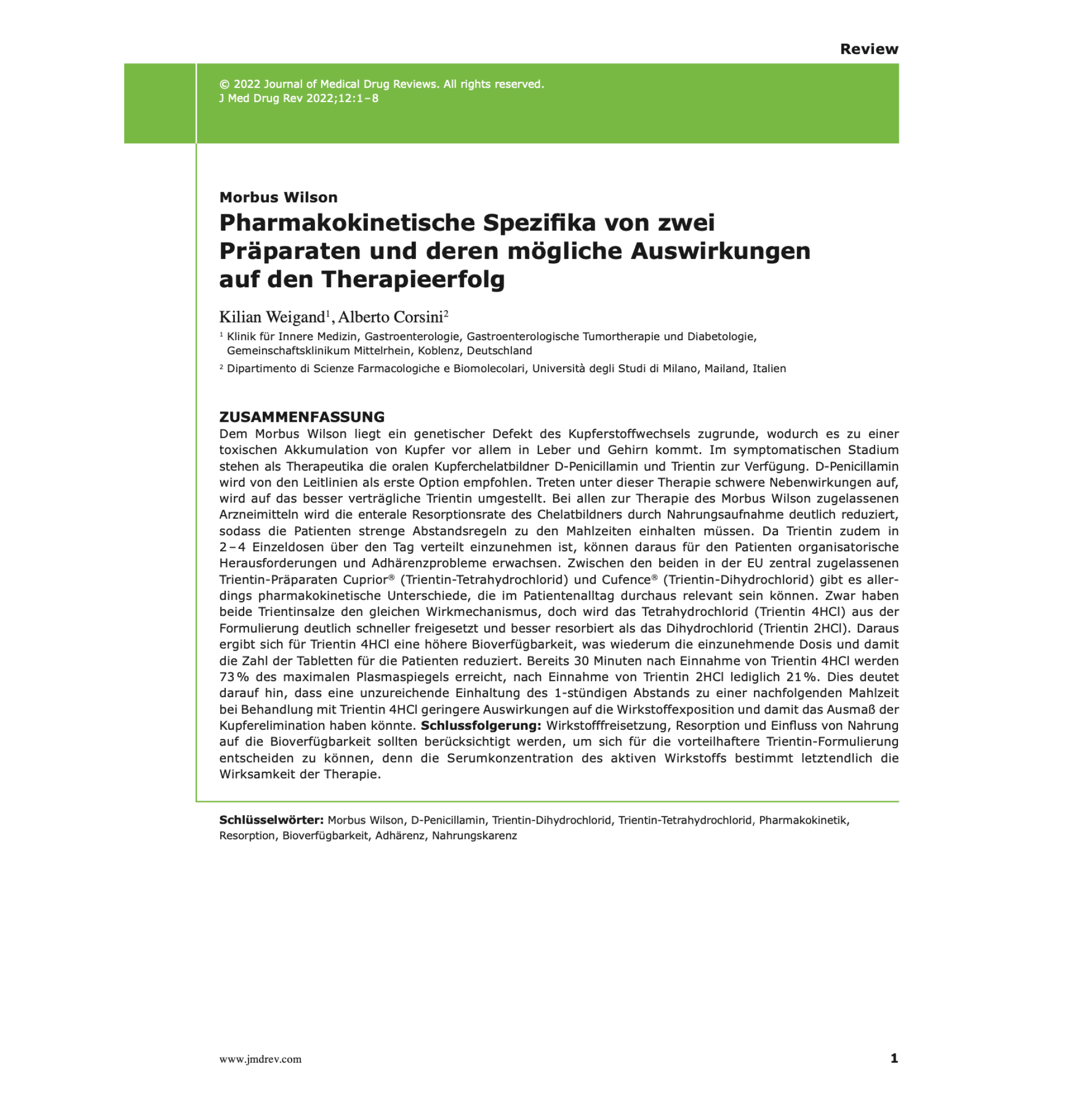Wirksamkeit und Verträglichkeit der 6-Monats-Depotformulierung eines LHRH-Agonisten zur Behandlung des fortgeschrittenen Prostatakarzinoms
J Med Drug Rev 2015;5:43–48
Wir untersuchten die Wirksamkeit und Verträglichkeit einer 6-Monats-Retardmikrokapsel-Formulierung des LHRH-Agonisten Leuprorelinacetat bei Patienten mit fortgeschrittenem Prostatakarzinom. In diese nicht-interventionelle Studie (NIS) wurden 480 Patienten aus 62 urologischen Praxen eingeschlossen, von denen 471 Patienten auswertbar waren. Die Studie hatte einen Beobachtungszeitraum von 6 Monaten und es wurden aufgrund der unterschiedlichen Vorbehandlungen folgende Patienten-Subgruppen gebildet: Erstdiagnose, Watchful Waiting, Radikale Prostatektomie, Strahlentherapie, endokrine Therapie generell und LHRHa-Therapie. Im Rahmen dieser Veröffentlichung haben wir zwei dieser Subgruppen näher untersucht: Zum Einen die Patienten mit neu diagnostizierter Erkrankung ohne endokrine Vorbehandlung (Gruppe 1; n = 60) und solche, die bereits vorher mit einem LHRHa (LHRH-Agonisten/-Antagonisten) behandelt worden waren (Gruppe 2; n = 277). Nach der Behandlung mit einer 6-Monats-Depotspritze Leuprorelinacetat waren bei den Patienten der Gruppe 1 (ohne endokrine Vorbehandlungen) die Werte des prostataspezifischen Antigens (PSA) von 5,8 ng/ml (median) auf 0,5 ng/ml gefallen; bei den Patienten der Gruppe 2 (mit LHRHa vorbehandelte Patienten; mediane Behandlungsdauer 30,6 Monate) war der PSA-Spiegel weiter rückläufig (median 0,4 ng/ml vs. 0,7 ng/ml zu Behandlungsbeginn). In Gruppe 1 wurde der Testosteronspiegel von median 2,5 auf 0,12 ng/ml supprimiert. In der Gesamtgruppe mit verfügbaren Testosteron-Daten (n = 152) nahm der Testosteronspiegel statistisch signifikant von median 0,25 auf 0,10 ng/ml ab (p = 0,0001). Nur bei 6 % aller Patienten (2 % in Gruppe 1) wurde nach EORTC-Kriterien eine Progression der Erkrankung festgestellt. An unerwünschten Ereignissen traten Hitzewallungen (1,46 %) und Rötungen an der Einstichstelle (1,04 %) auf. Die Behandlung führte zu keinen klinisch relevanten Veränderungen von Körpergewicht, Body-Mass-Index und Laborwerten und war gut verträglich. Zusammenfassend kann gesagt werden, dass die Behandlung von Patienten mit fortgeschrittenem Prostatakarzinom mit einer 6-Monats-Depotspritze des LHRH-Agonisten Leuprorelinacetat zu einem therapeutisch gewünschten signifikanten Rückgang der PSA-Werte führte; ebenso wurden die Testosteronspiegel zuverlässig unter das Kastrationsniveau gesenkt. Insgesamt war die Remissionsrate hoch und die Verträglichkeit gut. Von der Depot-Spritze profitierten sowohl Patienten mit neu diagnostizierter Erkrankung als auch solche, bei denen bereits mit einem LHRHa vortherapiert wurde und bei denen nun die Therapie mit dem 6-Monats-Depot fortgesetzt wurde.
Six-Month Depot Formulation of an LHRH Agonist for the Treatment of Advanced Prostate Cancer – Efficacy and Tolerability
We investigated the efficacy and tolerability of a 6-month depot microcapsule formulation of the LHRH agonist leuprorelin acetate in patients with advanced prostate cancer. A total of 480 patients from 62 office based urologists were enrolled in this non-interventional study (NIS), of whom 471 met inclusion criteria and were evaluable. The patients were followed up for 6 months. Given the variety of prior treatments, the following patient subgroups were considered: newly diagnosed, watchful waiting, radical prostatectomy, radiotherapy, endocrine treatment in general, and LHRH agonist / antagonist treatment in particular. In the present analysis we focused on two of these subgroups: Newly diagnosed patients with no previous endocrine treatment (Group 1, n=60) and patients previously treated with an LHRH agonist/antagonist (Group 2, n=277). Following injection of the 6-month depot of leuprorelin acetate, prostate-specific antigen (PSA) levels among Group 1 patients fell below pretreatment values (median, from 5.8 to 0.5 ng/mL), while among Group 2 patients (with a median duration of 30.6 months of prior LHRHa treatment) PSA levels further decreased (median, from 0.7 ng/mL to0.4 ng/mL). In Group 1, testosterone levels were suppressed from a median of 2.5 ng/mL to 0.12 ng/mL. In the total group with available testosterone data (n = 152), testosterone levels decreased statistically significantly (median, from 0.25 ng/mL to 0.10 ng/mL; p = 0.0001). Only 6 % of all patients (2 % in Group 1) experienced disease progression as defined by EORTC criteria. As Adverse events occured hot flushes (1.46 %) and injection site erythema (1.04 %). Treatment did not result in relevant changes of body weight, body mass index, or laboratory parameters and was well tolerated.
In conclusion, treatment of patients with advanced prostate cancer with a 6-month depot injection of the LHRHa leuprorelin acetate resulted in a significant and clinically meaningful decline in PSA levels. In addition, testosterone concentrations were reliably suppressed to levels clearly below the castration limit. Overall, a high remission rate and good tolerance was seen. Both newly diagnosed patients and those receiving the 6-month depot after previous LHRHa treatment benefited from the depot injection.
Wir untersuchten die Wirksamkeit und Verträglichkeit einer 6-Monats-Retardmikrokapsel-Formulierung des LHRH-Agonisten Leuprorelinacetat bei Patienten mit fortgeschrittenem Prostatakarzinom. In diese nicht-interventionelle Studie (NIS) wurden 480 Patienten aus 62 urologischen Praxen eingeschlossen, von denen 471 Patienten auswertbar waren. Die Studie hatte einen Beobachtungszeitraum von 6 Monaten und es wurden aufgrund der unterschiedlichen Vorbehandlungen folgende Patienten-Subgruppen gebildet: Erstdiagnose, Watchful Waiting, Radikale Prostatektomie, Strahlentherapie, endokrine Therapie generell und LHRHa-Therapie. Im Rahmen dieser Veröffentlichung haben wir zwei dieser Subgruppen näher untersucht: Zum Einen die Patienten mit neu diagnostizierter Erkrankung ohne endokrine Vorbehandlung (Gruppe 1; n = 60) und solche, die bereits vorher mit einem LHRHa (LHRH-Agonisten/-Antagonisten) behandelt worden waren (Gruppe 2; n = 277). Nach der Behandlung mit einer 6-Monats-Depotspritze Leuprorelinacetat waren bei den Patienten der Gruppe 1 (ohne endokrine Vorbehandlungen) die Werte des prostataspezifischen Antigens (PSA) von 5,8 ng/ml (median) auf 0,5 ng/ml gefallen; bei den Patienten der Gruppe 2 (mit LHRHa vorbehandelte Patienten; mediane Behandlungsdauer 30,6 Monate) war der PSA-Spiegel weiter rückläufig (median 0,4 ng/ml vs. 0,7 ng/ml zu Behandlungsbeginn). In Gruppe 1 wurde der Testosteronspiegel von median 2,5 auf 0,12 ng/ml supprimiert. In der Gesamtgruppe mit verfügbaren Testosteron-Daten (n = 152) nahm der Testosteronspiegel statistisch signifikant von median 0,25 auf 0,10 ng/ml ab (p = 0,0001). Nur bei 6 % aller Patienten (2 % in Gruppe 1) wurde nach EORTC-Kriterien eine Progression der Erkrankung festgestellt. An unerwünschten Ereignissen traten Hitzewallungen (1,46 %) und Rötungen an der Einstichstelle (1,04 %) auf. Die Behandlung führte zu keinen klinisch relevanten Veränderungen von Körpergewicht, Body-Mass-Index und Laborwerten und war gut verträglich. Zusammenfassend kann gesagt werden, dass die Behandlung von Patienten mit fortgeschrittenem Prostatakarzinom mit einer 6-Monats-Depotspritze des LHRH-Agonisten Leuprorelinacetat zu einem therapeutisch gewünschten signifikanten Rückgang der PSA-Werte führte; ebenso wurden die Testosteronspiegel zuverlässig unter das Kastrationsniveau gesenkt. Insgesamt war die Remissionsrate hoch und die Verträglichkeit gut. Von der Depot-Spritze profitierten sowohl Patienten mit neu diagnostizierter Erkrankung als auch solche, bei denen bereits mit einem LHRHa vortherapiert wurde und bei denen nun die Therapie mit dem 6-Monats-Depot fortgesetzt wurde.
Six-Month Depot Formulation of an LHRH Agonist for the Treatment of Advanced Prostate Cancer – Efficacy and Tolerability
We investigated the efficacy and tolerability of a 6-month depot microcapsule formulation of the LHRH agonist leuprorelin acetate in patients with advanced prostate cancer. A total of 480 patients from 62 office based urologists were enrolled in this non-interventional study (NIS), of whom 471 met inclusion criteria and were evaluable. The patients were followed up for 6 months. Given the variety of prior treatments, the following patient subgroups were considered: newly diagnosed, watchful waiting, radical prostatectomy, radiotherapy, endocrine treatment in general, and LHRH agonist / antagonist treatment in particular. In the present analysis we focused on two of these subgroups: Newly diagnosed patients with no previous endocrine treatment (Group 1, n=60) and patients previously treated with an LHRH agonist/antagonist (Group 2, n=277). Following injection of the 6-month depot of leuprorelin acetate, prostate-specific antigen (PSA) levels among Group 1 patients fell below pretreatment values (median, from 5.8 to 0.5 ng/mL), while among Group 2 patients (with a median duration of 30.6 months of prior LHRHa treatment) PSA levels further decreased (median, from 0.7 ng/mL to0.4 ng/mL). In Group 1, testosterone levels were suppressed from a median of 2.5 ng/mL to 0.12 ng/mL. In the total group with available testosterone data (n = 152), testosterone levels decreased statistically significantly (median, from 0.25 ng/mL to 0.10 ng/mL; p = 0.0001). Only 6 % of all patients (2 % in Group 1) experienced disease progression as defined by EORTC criteria. As Adverse events occured hot flushes (1.46 %) and injection site erythema (1.04 %). Treatment did not result in relevant changes of body weight, body mass index, or laboratory parameters and was well tolerated.
In conclusion, treatment of patients with advanced prostate cancer with a 6-month depot injection of the LHRHa leuprorelin acetate resulted in a significant and clinically meaningful decline in PSA levels. In addition, testosterone concentrations were reliably suppressed to levels clearly below the castration limit. Overall, a high remission rate and good tolerance was seen. Both newly diagnosed patients and those receiving the 6-month depot after previous LHRHa treatment benefited from the depot injection.




